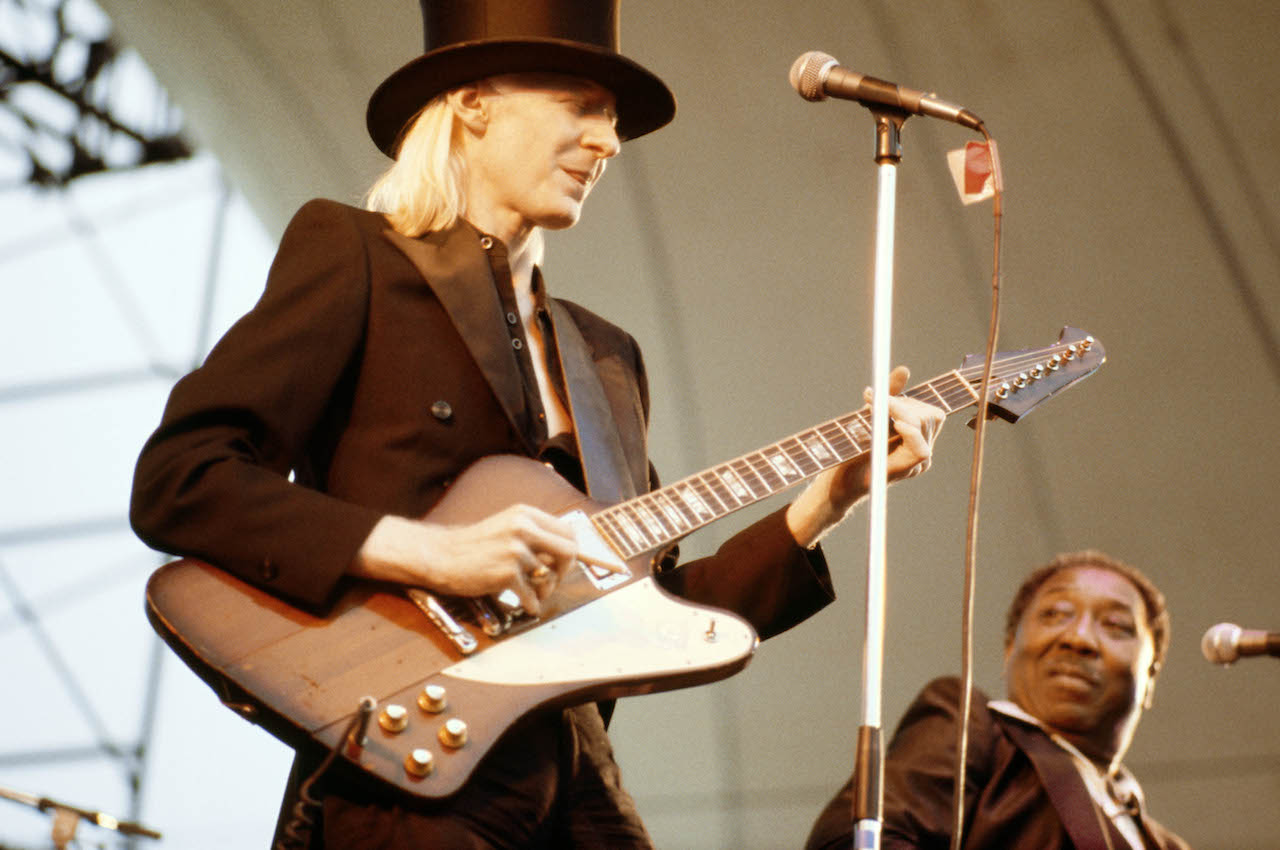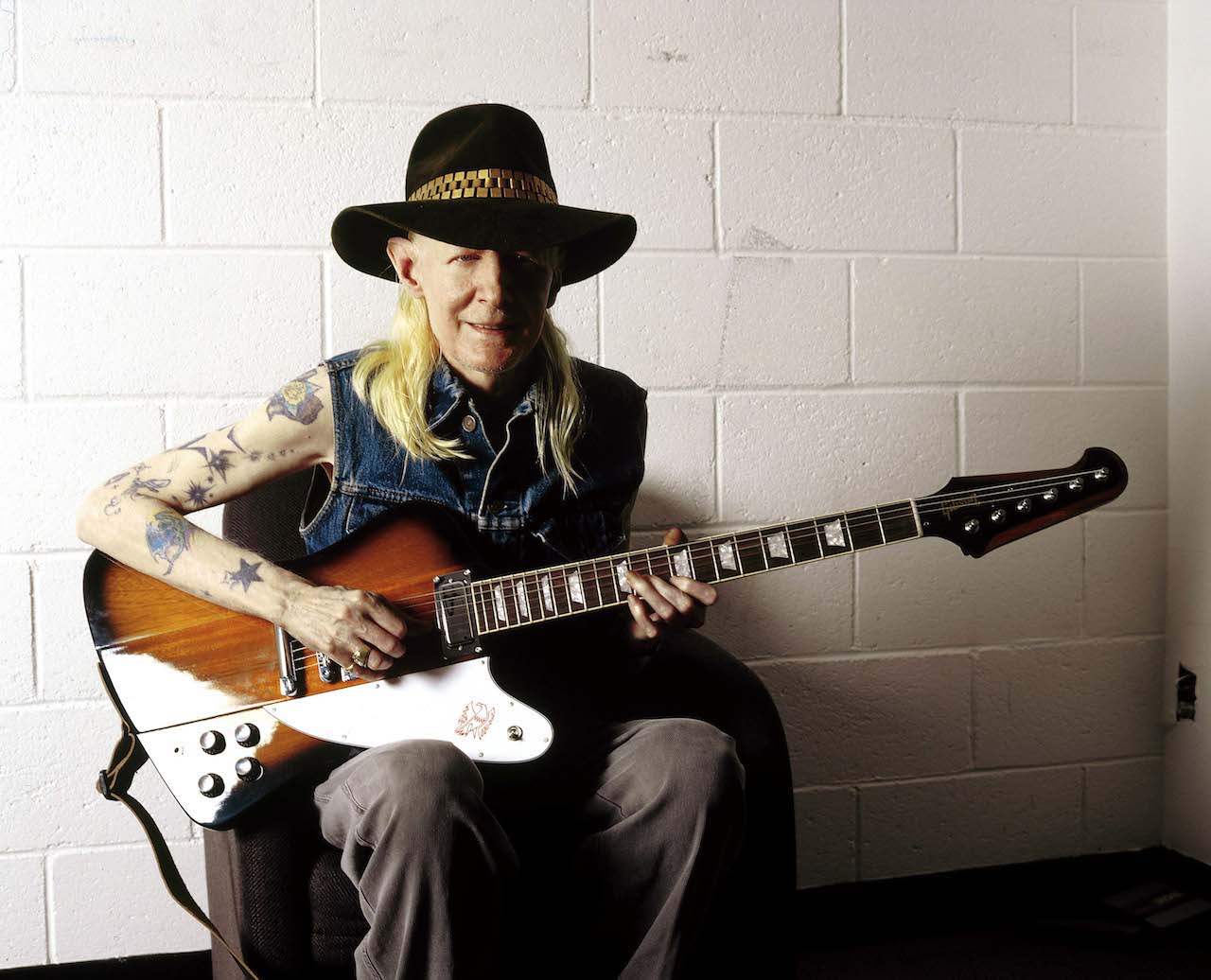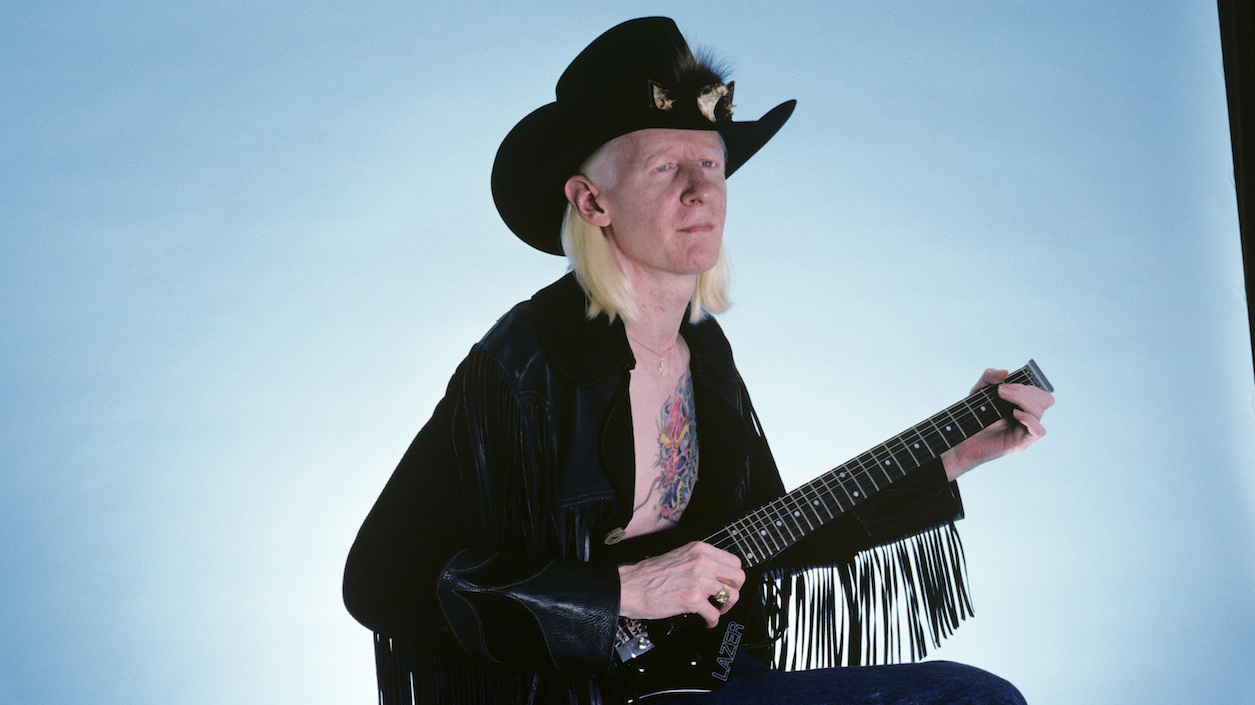This article first appeared in Issue 7 of The Blues, June 2013.
Bringing Texas white-blues lightning to the world since 1969 – but on which albums did Johnny Winter flash brightest, strike hardest and blaze hottest?
John Dawson Winter III, like his near-contemporary scion of the Texan upper-middle class William F Gibbons, was first exposed to blues and R&B because that was what his family’s maid listened to as she cooked and cleaned. He identified with the bluesmen because, like him, they were the wrong colour: they were black and he, as an albino, was too white. As a result, his own music was what his original bassist Tommy Shannon called ‘power blues’: “Blues, but played with the power of rock’n’roll.”
Onstage from the age of 15, he played blues, rock, pop and anything else anybody would pay for. Ten years later, following a rave review in Rolling Stone, his hot-wired, super-speedy blues-rock guitar and striking looks got him signed by a New York-based manager and sent out into the world to compete with Cream, Hendrix and Led Zeppelin. Soon persuaded to ditch his Texas blues band and go full-on hard rock, he scored his biggest success with the bludgeoning Johnny Winter And, acquiring a major heroin habit in the process.
In 1976, tiring of arena rock, he returned to his blues roots, producing a series of magnificent autumnal albums for Muddy Waters and gaining, for the first time, the blues cred he’d always craved. He’s played mainly blues ever since, but – to quote the critics – as ‘the bare electric skeleton of rock dancing in the mind-juice river’ or ‘an IBM computer playing a 50-string guitar’, while his equally distinctive singing has been compared to ‘a tuneable belch’ or ‘a coyote gargling with sandpaper’.
Frailer and more spectral than ever as his 70th birthday approaches: every now and then it’s kinda hard to tell, but he’s still alive and well.

Essential (The perfect introduction)
SECOND WINTER (Columbia Legacy)
Combines scorching covers and stomping originals to spectacular effect.
His official major-label debut was both underweight and overcooked, lacking the raw spontaneity of his Austin demos, but the ‘three-sided’ Second Winter brought it all home, mapping JW’s blues-rock landscape in all its idiosyncratic glory.
Adding younger brother Edgar to the team on sax and keys, it had a great Richard Avedon sleeve-shot and a prime selection of originals and covers, including the 120mph fireball version of Dylan’s Highway 61 Revisited, Little Richard’s Miss Ann slowed down to a languorous Lowell Fulson-style shuffle and a hectic sprint through Chuckleberry’s Johnny B Goode which should be entirely unnecessary but somehow isn’t.
And the home-brewed tunes which made up the final vinyl side were just spectacular: the stomping slide epics I Love Everybody and Fast Life Rider, the hyper-speed Hustled Down In Texas and the jazzy I Hate Everybody all revealed Winter to be more than just another white boy lost in the blues.
And, to add to this embarrassment of Roadhouse Deluxe riches, the Legacy edition comes bundled with a scorchio 1970 live set cut at the Albert Hall (and including an early version of bro’ Edgar’s Frankenstein, not to mention his finest enraged-bee vocal impression on the Nashville Teens’ Tobacco Road).
Relegated to the vaults after Winter dumped his original band in favour of the former McCoys, it was replaced on the release schedule by the subtle-it-ain’t-overwhelming-it-is Live Johnny Winter And, loaded with nuggets such as Good Morning Little Schoolgirl and Jumpin’ Jack Flash, which turned out to be his all-time bestseller. Still, better 43 years late than never.
Superior (The releases that built his reputation)
NOTHIN’ BUT THE BLUES (Columbia Legacy)
Career-defining performances with Muddy Waters’ band.
In the immediate wake of his triumphant production of Muddy Waters’ 1977 comeback album Hard Again and the subsequent tour, Winter took the same band – including James Cotton (harp), Pinetop Perkins (piano) and the great Willie ‘Big Eyes’ Smith (drums), not to mention The Big Mud himself stepping up for a duet vocal on Walkin’ Through The Park – into the same studio to cut an album of his own. Their relaxed Chicago-approved whomp smoothed down Winter’s tendency towards hyperthyroid excess without dimming his fire or softening his punch, and he rose to the occasion with some of the most passionate and authentic performances of his career.
- The other blues brothers: When Joe Perry Met Johnny Winter
- Q&A: Edgar Winter
- Muddy Waters Buyer's Guide
- Johnny Winter: Life Inside His Final Tour
THE PROGRESSIVE BLUES EXPERIMENT (Capitol)
Rough’n’ready white-boy blues.
Two of the words in this album’s title are accurate, and one of them is ‘the’. There’s nothing ‘progressive’ or ‘experimental’ here: it’s a live set by the original trio cut as four-track demos in an empty Austin club, pre-dating his breakthrough and the Columbia deal. It’s as rough, raw and funky as white-boy blues ever got: straight-up live (apart from Blind Willie McTell’s Broke Down Engine, where Winter overdubs harp and mandolin atop his National Steel acoustic) and soaked to the bone in the influences of Muddy Waters, BB King and – on a hectic Mean Town Blues – John Lee Hooker, all cranked up and adrenalised to the max.

ROOTS (Megaforce)
Guest-laden stroll into classics.
The Thin White Flash’s most recent album as of now, and the title is the giveaway. Winter anatomises his early inspirations (Elmore James, Muddy Waters, Chuck Berry, Little Walter, T-Bone Walker, Jimmy Reed and more) in the company of guests (Vince Gill, Susan Tedeschi, bro’ Edgar, John Medeski and fellow slidemeisters Derek Trucks, Sonny Landreth and Warren Haynes) who add to the fun big-time without even getting in the skinny guy’s way. From anybody else, this rummage through the bluesily rocking treasure-house of the 1950s would considered majorly hi-energy; from the perennially hot-wired Mr Winter, it’s pleasantly, funkily chilled and laid-back: passionate intensity recollected and recreated in (comparative) tranquillity.
Good (Worth a listen)
GUITAR SLINGER (Alligator)
A blast for independence.
Freed from the big label, the rock manager and their demands that he court the mainstream, Winter signed to Chicago-based blues indie Alligator in the 80s. He borrowed Albert Collins’ bass monster Johnny B Gayden and cut three albums – the other two being Serious Business and Third Degree, both also deserving of your attention, though the latter’s the better – cementing his identity as a born-again bluesman in the Texas tradition. After one more disastrous attempt at major label arena rock, he went blues indie again in the 1990s with two PointBlank albums (Let Me In and Hey, Where’s Your Brother, respectively guesting Dr John and bro Edgar), which bit almost as deep as the Alligators.
STILL ALIVE AND WELL (Columbia Legacy)
Revived and kicking.
This 1973 post-rehab ‘comeback’ album is still Winter’s grooviest, funkiest and most likeable ‘rock’ effort, though the better, bluesier half of the And Live album runs it close. Produced by Rick Derringer, who contributed a few guitar cameos as well as writing two of the standout tracks (the title song and the gorgeous country ballad Cheap Tequila), Winter’s in full-on ‘giant refreshed’ mode, kicking off with a rousing, roaring Rock Me Baby. Elsewhere: the grittily bluesy Too Much Seconal, a hectic slide shuffle called Rock & Roll and Silver Train, a Goats Head Soup song the Stones gave him even before they cut it themselves.
Avoid (Like the plague)
WINTER OF ’88 (MCA/Universal)
Stadium fandango misfires.
After the Alligator trilogy, this was Winter’s final assault on the arena-rock big league, teaming up with ZZ Top producer Terry Manning. Unfortunately, what should have been a no-brainer turned out to be exactly that: the Rev Willy G is a postmodern retro-futurist whereas Winter is a straight-up traditionalist whose 50s-based blues-rock aesthetic sits uncomfortably with drum machines and 80s-style Big Guitars. No wonder that he’s rolled with Yer Proper Blues ever since.
